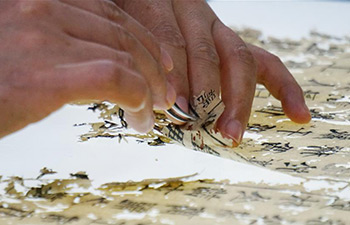JERUSALEM, Dec. 2 (Xinhua) -- Israel's police said Sunday they have found enough evidence to press charges against Prime Minister Benjamin Netanyahu and his wife Sara, in a bribery case involving the country's largest telecom company.
In a joint statement concluding the nine-month-long investigation, dubbed by the police as "Case 4000," the police and Israel Securities Authority recommended indicting the prime minister and his wife for accepting bribes, fraud, and breach of trust.
According to the statement, Netanyahu promoted regulations favoring the telecom giant, the Bezeq Group, in return for favorable coverage in Walla, a news website. Both Bezeq and Walla were controlled by Shaul Elovitch, a businessman and Netanyahu's long-time friend.
The police also recommended indicting Elovitch and his wife Iris.
Revealed by the investigation, between 2014 and 2017, when the prime minister also acted as Israel's communication minister, he awarded Bezeq with regulatory and financial benefits worth hundreds of millions of U.S. dollars.
"The main suspicion is that the prime minister took bribes and acted in a conflict of interest by intervening in regulatory decisions that favor Shaul Elovitch and the Bezeq Group, while at the same time, directly and indirectly, interfering with the content of the Walla site in a way that would benefit him," the statement read.
The "improper conduct" between Netanyahu and Elovitch included "diverting media coverage in exchange for preferable regulation," the police said.
"The prime minister and his associates intervened in a blatant and ongoing manner, and sometimes even daily, in the content published by the Walla News website, and also sought to influence the appointment of senior officials (editors and reporters) via their contacts with Shaul and Iris Elovitch," the police added.
Under Israeli regulations, the final decision whether to carry out the indictment should be made by Attorney General Avichai Mandelblit.
Meanwhile, Netanyahu has denied any wrongdoing.
Shortly after the police recommendations were publicly announced, the prime minister released a statement dismissing the allegations.
"I am sure that also in this case the relevant authorities, after examining the matter, will reach the same conclusion that there was nothing because there is nothing," he said in the statement.
In February, the police recommended to indict Netanyahu for a series of corruption charges including bribery, fraud, and breach of trust in two other cases, "Case 1000" and "Case 2000."
In "Case 1000," Netanyahu and his family allegedly received expensive cigars, champagne, and jewelry worth about 1 million new shekels (about 268,200 dollars) from the Israeli businessman and Hollywood tycoon, Arnon Milchan, and Australian businessman, James Packer, between 2007 and 2016.
In "Case 2000," Netanyahu allegedly received bribes from Arnon Mozes, the publisher of Yedioth Ahronoth, one of Israel's largest newspapers.
According to the police, Netanyahu and Mozes held talks over an "exchange deal," in which Netanyahu would receive favorable coverage in Yedioth Ahronoth in return for promoting a law and other measures that would limit the distribution of Israel Hayom, Yedioth's main rival.
The police announcement cast doubts on Netanyahu's ability to end his current term, with the opposition calling for his immediate resignation.

















